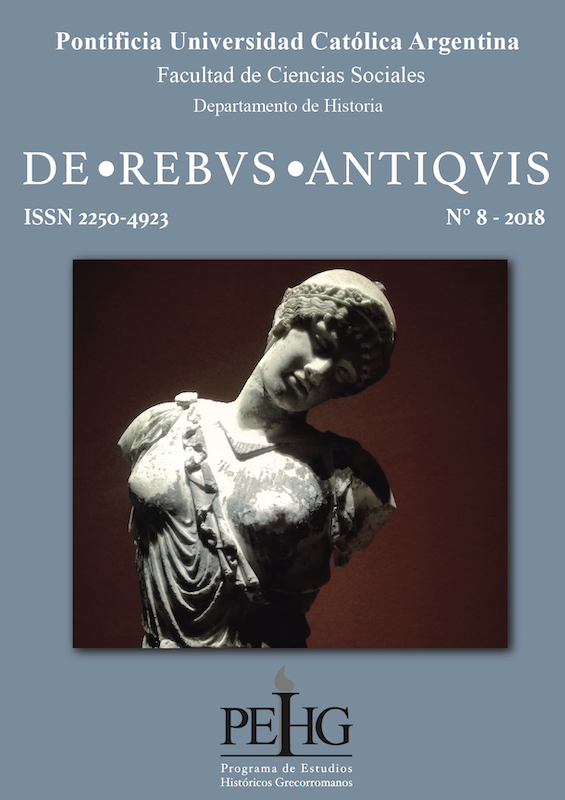Hesiod and the conditions of an habitable World. An ecological ideal.
Keywords:
Origins, Works and Days, Hesiod, Karl Jaspers, kosmosAbstract
The article will make a reading of certain fragments of Works and Days that will be the starting point for the search of key concepts that would make habitable a hypothetical new world: justice, logos, virtue, work, and piety. These basic pillars will be considered as “origins” following the definition is given by Jasper in Philosophy from the point of view of existence, that is, a source from which a questioning spirit flows and which produces an interrogative attitude.
We will see how these five principles intersect to encompass the relationships between humans and gods, between strong and weak, just and unjust humans and also how all of them would result in a fair and new oikos capable of harbouring the kosmos desired by the poet.Downloads
References
FUENTES PRIMARIAS:
HESÍODO. (2000). Obras y fragmentos Madrid: Gredos.
HESIOD. (2006). Theogony. Works and Days. Testimonia. Most, G. W. (editor y traductor). Loeb Classical Library. London: Harvard University Press.
LIDDEL, H. G., SCOTT, R. (1996). A Greek-English Lexicon. Oxford: Clarendon Press.
LIÑARES, Lucía. (2005). Hesíodo. Teogonía, Trabajos y Días. Edición bilingüe, Buenos Aires: Losada.
VIANELLO DE CÓRDOVA, Paola. (1978). Hesíodo Teogonía. México: Universidad Nacional Autónoma de México.
BIBLIOGRAFÍA:
ARRIGHETTI, Graziano. (1996). Hésiode et les Muses. En: de BLAISE, F., JUDET DE LA COMBE, P. et ROUSSEAU, P. (dirs.). Le métier du mythe. Lectures d' Hésiode. Paris, Presse Universitaires du Septentrion: 53-70.
BUBER, Martin. (1974). Yo y tú. Buenos Aires: Nueva Visión.
COLOMBANI, María Cecilia. (2016). Hesíodo Discurso y Linaje. Una aproximación arqueológica. Mar del Plata: EUDEM.
DETIENNE, Marcel. (1986). Los maestros de verdad en la Grecia Arcaica. Madrid: Taurus.
DICKIE, Matthew W. (1978). Díke’ as a moral term in Homer and Hesiod. Classical Philology, 73(2), 91-101.
FONTENROSE, Joseph. (1974). Work, justice, and Hesiod’s five ages. Classical Philology, LXIX(1), 1-16.
FOUCAULT, Michel. (1992). Las redes del poder. Buenos Aires: Almagesto.
GAGARIN, Michael. (1974). Hesiod’s Dispute with Perses. Transactions of the American Philological Association, 104: 103-111.
GERNET, Louis. (1981). Antropología de la Grecia Antigua. Madrid: Taurus.
HEIDEGGER, Martin. (1997). Ser y tiempo. Santiago de Chile: Editorial Universitaria.
JASPERS, Karl. (1981). La filosofía desde el punto de vista de la existencia. Madrid: Fondo de Cultura Económica.
NESCHKE, Ada Babette. (1993). Dikè. La philosophie poétique du droit dans le “mythe des races d’ Hésiode. En de Blaise, F., Judet de La Combe, P. et Rousseau, P. (dirs). Le métier du mythe. Lectures d' Hésiode. Paris: Presse Universitaires du Septentrion, 465-478.
NIETZSCHE, Friedrich. (1972). Genealogía de la moral. Madrid: Alianza.
SARTRE, Jean Paul. (1994). El existencialismo es un humanismo. México DF: Ediciones Quinto Sol.
Downloads
Published
How to Cite
Issue
Section
License










